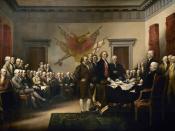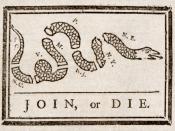The Causes for France?s Involvement in the American Revolution
Many historians argue that America may not have gained her independence from Great Britain without the monetary and military aid she received from France (Higginbotham 431). France?s aid was very substantial but her motives were questionable. A close analysis of Kenneth Waltz?s three images, and especially the second image of the internal structure of the state, reveal that France?s foreign policy, to seek revenge on Great Britain from France?s loss in the French and Indian War, and the Seven Years War, are the primary reasons why France decided to assist the rebelling colonies.
In early 1776 the French foreign minister, Charles Gravier count de Vergennes, gave King Louis XVI a report he had written called ?Considerations?. It warned the king that if Great Britain and the American colonies ended their war with a peace treaty, they might then attack the French owned colonies in the West Indies.
He proposed that France provide secret arms aid to the rebels in order to prolong the Revolution, giving France and Spain enough time to strengthen the defenses of their colonies. In response to the paper, the king approved an apportionment of one million livres tournois to buy arms for the American rebels in early May 1776. The money was sent through Caron de Beaumarchais as part of the fictitious mercantile firm Roderique Hortalez and Company (Dull 57-61).
On December 21, 1776, a commission that included Benjamin Franklin arrived in France asking for a treaty of amity and commerce, military supplies and the loan of French ships. ?Lacking anything substantive to offer in return for France?s risking war by signing a commercial treaty with America, they issued thinly veiled threats that the American cause risked collapse if France remained aloof? ( Dull 79). Their...


